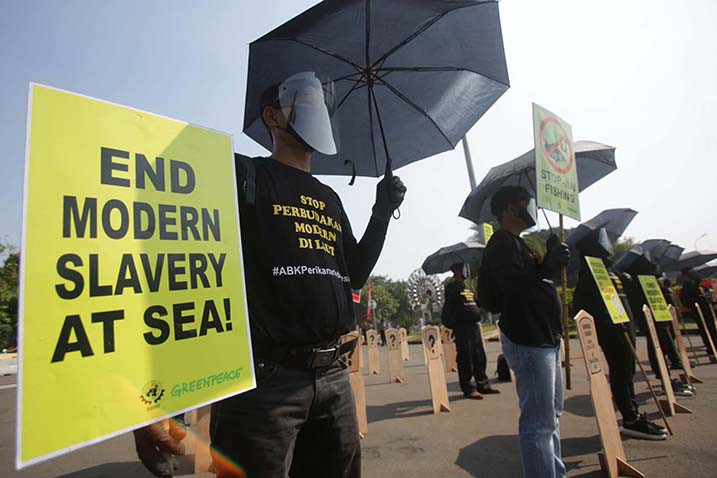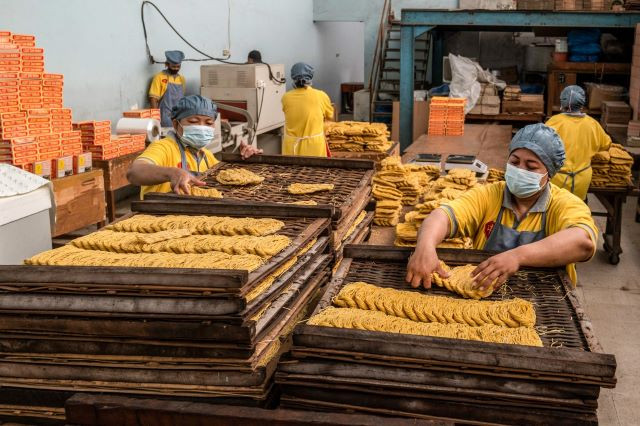Popular Reads
Top Results
Can't find what you're looking for?
View all search resultsPopular Reads
Top Results
Can't find what you're looking for?
View all search results‘New’ or ‘better’ normal for migrants in ASEAN?
COVID-19 responses have also fallen short of protecting the workers and respecting their rights.
Change text size
Gift Premium Articles
to Anyone

T
he COVID-19 pandemic is highlighting major divides in society and exposing preexisting vulnerabilities. A case in point are the estimated 10 million international migrants in Southeast Asia, mainly consisting of lower skilled-workers most often in irregular positions. The pandemic has disproportionately affected them, if not in terms of infections, in terms of socioeconomic impacts and disruption to their already precarious lives.
In Singapore, national spatial modelling exercises and containment measures missed to include the large migrant population as they simply did not consider it part of the inhabitants. The government was taken aback by the growing spread of the infection in migrants’ dormitories and implemented stay-at-home orders, despite activists arguing that such measures will continue to expose them to transmission due to the substandard living conditions.
In September, the dormitories, which house over 300,000 construction and shipbuilding workers in packed rooms that can hold up to 20 people, accounted for almost 95 percent of Singapore’s 57,000 infections. Though it is now decreasing, the number of daily infections in dormitories continue to outnumber those in the local communities.
In other destination countries, COVID-19 responses have also fallen short of protecting the workers and respecting their rights. In Malaysia, early in the epidemics, migrants and refugees were totally locked-down in settlements with no running water or isolation space and in great stress. And when the country started to reopen last May, they were subjected to immigration raids and arrests leading to a surge of infections in detention centers.
In Thailand, the hastily announced partial lockdown of Bangkok and border closure order in March triggered a mass exodus of migrants from Myanmar, Cambodia and Laos. Fearing being trapped in Thailand with no jobs and social protection, they took the risk of exposure in crowded transportation vehicles and border areas.
At the same time, workers in sectors exempted from lockdown such as construction were seen heading to work as usual in filled trucks with no social distancing and masks. A recent study found that last July, 57 percent of those interviewed were not provided basic personal protective equipment of masks and hand sanitizer by their employer – a figure higher than the already significant average of 33 percent for the region. Abuses have exacerbated, with greater pressure on migrants to take unpaid leave, refuse time off during the lockdown or being prevented from leaving by passport’s confiscation.
Sending countries have demanded migrant workers abroad not to return, but no bilateral arrangements have been made to enable this to happen. Vast numbers of Indonesian migrants had to return home from Malaysia, East Asia and the Middle East due to visa limitations and loss of employment, having to take risks along the way and experiencing stigmatization on arrival as the perceived “importer” of the disease.
Worries are also rife among returnees about their not being able to migrate again – and thus to provide their families with much needed resources – due to regulations suspending the formal overseas placement of Indonesian migrant workers and the closure of the destination countries. Likewise, in the Philippines, many lost jobs or were unable to take up positions because of travel restrictions. Those stranded in foreign countries often are not entitled to social welfare and face rising xenophobia and abuses.
Being one of the world’s main labor exporting countries, an unprecedented fall in overseas remittances is expected, with an increasing number of families being pushed into hardship. Thai migrants abroad have experienced similar conditions and the higher number of infected returnees from usual migrant destination countries can be seen as a signal of the disproportionate impact on migrants.
As the pandemic continues unabated, regional institutions are failing to work out ways to protect migrants and their livelihoods. ASEAN summits and declarations to strengthen cooperation among member states in public health measures and resources have paid little attention to migrants. Promises made in May under the joint statement of ASEAN Labor Ministers to “provide appropriate assistance and support to ASEAN migrant workers […] working toward their health, well-being and safety as well as facilitating their movement and reuniting them with their families” have barely been implemented, when not ignored.
Governments have not given recognition to the contribution of migrants to national economies and the often-minimal social protection and welfare programs have tended to exclude migrants, particularly undocumented migrants. Containment measures have also discriminated them as reflected in reduced access to testing and quality treatment and poorer quarantine facilities.
Costs of health documentation and costs of repatriation, particularly transportation, COVID-19 tests, and quarantine costs are disproportionate to migrants’ meagre incomes, depleting their savings and increasing their debts. Several disease control acts criminalize migrants for entering countries of destination or returning to home countries without accounting for their needs.
Observers are quick to point out that the pandemic only serves to magnify the shortcomings of an already broken migration management system. In their hope for a better future, some go as far as seeing COVID-19 as a transformer that will enable greater awareness of migrants’ poor conditions eventually leading to safer migration.
Propositions to address the current structural weakness vary from having so far reticent destination countries adopt international conventions to improving living and housing arrangements and rising wages and benefits. Calls are also there for guaranteeing access to health care and social protection programs for migrants and refugees, irrespective of their legal status and to decriminalize migrant irregularity.
On Monday, a day ahead of the 13th ASEAN Forum on Migrant Labor, the Mekong Migration Network issued a statement to remind states of their promises and encourage them to collaborate to seek “pragmatic solutions that facilitate movement while not undermining public health”.
Although it is too early to judge how realistic these aspirations are, indications are far from promising. In spite of heightened concerns in the media and among civil society and United Nations organizations, only the Singaporean government has pledged some concrete measures by committing to improving the dire conditions of dormitories and allocate somewhat more space to migrants.
If more structural changes that question the very perception of lower-skilled migrant worker and the double standards we uphold are not proposed, the “new normal” can be expected to continue current conditions, rather than break in a “better normal” centered on justice and dignity and the pursuit of economic and health equity regardless of citizenship.
***
The writer is associate professor at the Institute for Population and Social Research (IPSR), Mahidol University; director of SEA Junction, Bangkok; and emeritus regional director for Southeast Asia with the Rockefeller Foundation and the International Development Research Center. The article was written for the upcoming newsletter of IPSR’s Mahidol Migration Center.









